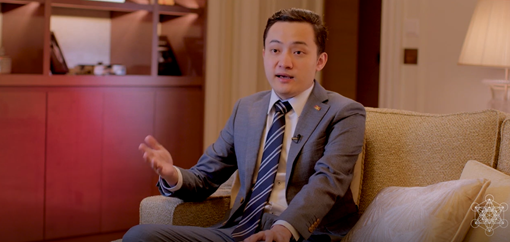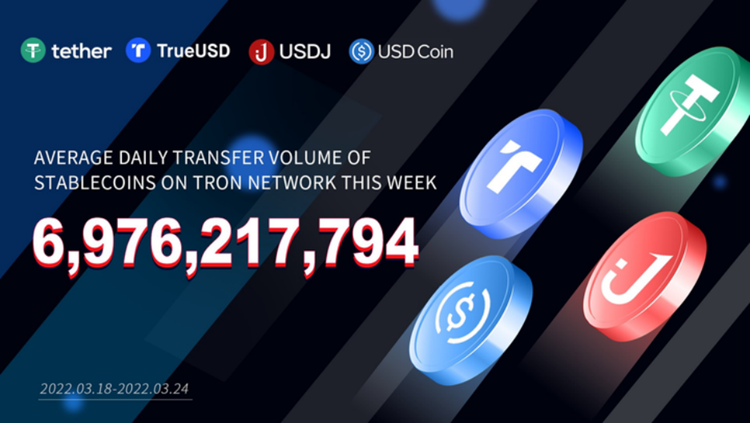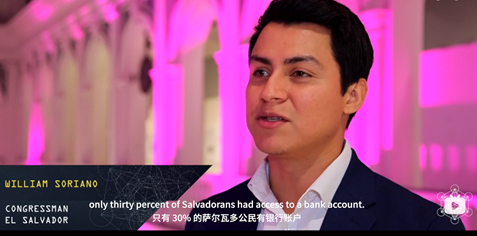The renowned documentary series “The Future is Now” has recently shifted its focus to the blockchain industry. The team produced its first-ever crypto-related documentary titled “Aligning the Future,” shedding light on the development of Bitcoin and other digital currencies across the globe.
H.E. is the star of this show. Justin Sun is the founder of TRON and also the Ambassador and Permanent Rep of Grenada at the WTO. He was joined by William Soriano, El Salvador congressman, and other crypto experts who gave their thoughts on the future.

H.E. Justin Sun is the founder of TRON and the Ambassador and Permanent Rep for Grenada to WTO
“Eventually we will have three kinds of nations. Although one kind of country will use fiat traditional currency, others will be able to adopt digital currencies and become CBDCs. But we will also see some countries like El Salvador and Caribbean countries in the future that might adopt Bitcoin or cryptocurrency as their legal tender or financial settlement infrastructure.”H.E. Justin Sun answered questions about CBDCs (central banks digital currencies) in the global context.
He also added that as a believer in Hayek’s theory, he has faith in a currency market that is open to entire competition and embraces all types of currencies. Sun, a long-time veteran of digital currency, believes CBDCs could be listed on blockchains (including Ethereum and TRON) in the same way as stablecoins like USDT, TUSD and USDC. This will ensure that the cryptocurrency industry grows to its next level. He pointed out the fact that not all people have access to traditional financial services. The elimination of the threshold to financial infrastructure will benefit the whole world’s population. TRON and other blockchains have provided an affordable, accessible way to access financial services, and can offer more convenience for users.
 Stats about TRON’s stablecoin infrastructures
Stats about TRON’s stablecoin infrastructures
William Soriano (congressman from El Salvador), is another leader with the same views as Sun. He used local facts to support his view. El Salvador announced its plans to accept Bitcoin as legal currency, an unusual move supported by many reasons.

William Soriano, Congressman of El Salvador
Soriano is a leading advocate for Bitcoin, and blockchain. He stated that 30% of Salvadorans (or roughly 1.2 million) have access to bank accounts. However, only 3.8 million people have digital access, which means that 80% of Salvadorans are financially integrated.
Digital currencies allow Salvadorans to save money on international wire transfers fees. Because digital currencies use blockchain technology to settle and clear transactions, this is possible. Blockchain technology is rapidly becoming more popular in Salvador and helping people access their financial resources. Bitcoin’s volatile price makes it difficult to maintain value stability.
This is why recent focus has been on solutions that combine the advantages of blockchain technology with price stability. Stablecoins were previously discussed by H.E. Justin Sun is a digital currency that uses blockchain technology and can be pegged to US dollars. This lowers the barrier to financial inclusion, while also offering volatility solutions.
Even though stablecoins USDT and USDC may be more in demand, TUSD has the highest performance and reliability. TUSD is the industry’s only stablecoin that has been tested live on-chain by Armanino and then audited in real time by him.
TUSD was the first U.S.-dollar-pegged native stablecoin to be launched on Avalanche in March 2021. TRON went live one month later. It became the second natively-launched U.S. dollar pegged stablecoin after USDT.
TUSD was also an innovator in multi-chain deployment. It is now being supported by a series of blockchains, including Fantom Chain, Polygon and Cronos. This endorsement has received industry wide support. The total TUSD supply has surpassed 1.4 billion and ranks fourth in its peer group.